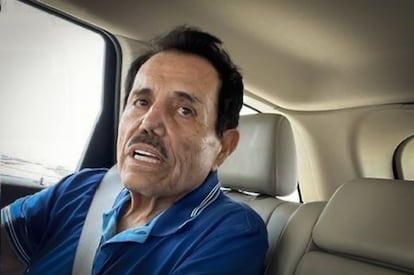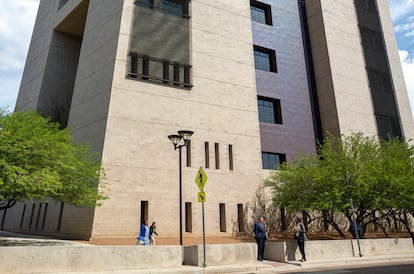‘El Mayo’ Zambada faces battery of charges amid conflicting accounts of his arrest
The founder of the Sinaloa Cartel returns to a Texas court, accused of drug trafficking, money laundering and at least four murders related to his criminal activities. The prosecution is asking the judge for more time and for the case to be recognized as ‘unusual and complex’

Weapons possession, organized crime, money laundering and trafficking of multiple substances, including fentanyl, and conspiracy to murder at least four rival drug traffickers while serving as one of the top leaders of the Sinaloa Cartel. These are just some of the 7 felony counts that Ismael “El Mayo” Zambada will have to answer for in the United States. On Thursday, the 76-year-old drug lord on Thursday will appear again in a courthouse of the Western District of Texas, in the border city of El Paso, where his legal team will receive an update on the status of the court process. He made his first appearance last week, when he pleaded not guilty to all charges.
The prosecution requested that the case be recognized as “unusual and complex” and asked the judge on Wednesday for more time given the enormous volume of evidence, the delicate nature of the crimes and the accused’s high profile, according to a document to which this newspaper has had access.
Zambada was seen in a wheelchair at his first hearing on Friday, held just hours after he was arrested at a rural New Mexico airport alongside Joaquín Guzmán Lopez, the son of “El Chapo” Guzman. The drug lord waived his right to be present at a preliminary hearing scheduled for Wednesday, where an investigating judge ordered him to be held without bail. Thursday’s hearing does require El Mayo to appear in court, at least according to the court’s calendar.
Zambada’s defense has had to manage both the start of the trial in the U.S., and the media circus surrounding the case. Frank Pérez — the lawyer who represents both Zambada and his son Vicente “Vicentillo” Zambada Niebla — dropped a bombshell last weekend, claiming that the 76-year-old had been kidnapped and betrayed by Guzmán López. He argued that El Chapo’s son handed him over to U.S. authorities, after being subdued by around six men wearing military uniforms. He also stated that his client had not negotiated his surrender with the United States: Zambada never set foot in prison in more than five decades of his cartel career.

Jeffrey Lichtman, the attorney for El Chapo’s son, broke his silence and denied the allegations on Tuesday. “When lawyers who are trying to score points with the media make accusations, then I ignore that because it’s meaningless,” said Lichtman, who also represented El Chapo in the so-called trial of the century in 2018. In that trial, Guzmán was sentenced to life in prison after Vicentillo and Jesús Rey Zambada, El Mayo’s brother, testified against him. The lawyer also denied that Guzmán López reached an agreement to surrender to the U.S., a point that had been widely accepted, according to information shared by the United States and Mexican governments after the arrest.
The case became even more complicated on Wednesday after José Luis González Meza, who appeared before the media as the legal representative of the Guzmán family in Mexico, contradicted Pérez and Lichtman, stating that El Mayo and El Chapo’s son turned themselves in voluntarily, after negotiating with U.S. authorities for four years. The lawyer said there was neither betrayal nor kidnapping. González Meza said in a statement that the relationship between the families that run the Sinaloa Cartel “has been impeccable” and denied that an internal war could break out in the criminal organization after the controversial arrest.
Hours earlier, another widely accepted aspect of the arrest was also called into question. In a press conference, the governor of the Mexican state of Sonora, Alfonso Durazo, said that the plane that took El Mayo and Guzmán López to the U.S. did not depart from Hermosillo, the state capital, as the government of Andrés Manuel López Obrador had initially reported last week. Durazo — former federal Secretary of Security — said that no aircraft with the characteristics of the plane that landed in New Mexico had been registered in airport records. Mexico’s Attorney General’s Office has opened an investigation to find out what really happened in the hours before the arrest.
In legal terms, the charges facing El Mayo in Texas are just a fraction of the sprawling accusations he faces in different jurisdictions in the United States. The case in the El Paso court only involves federal crimes committed on Texas soil or that affected that state. The case in question was opened in 2012 and concerns the war waged by the Sinaloa Cartel against the Juarez Cartel, on the border between the two countries.
It is established, for example, that El Mayo and El Chapo were involved, along with their lieutenants, in the torture and murder of three rival drug lords, identified only by their initials: R. M. V., his brother J. M. V. and his uncle G. M. A. The murder was ordered in May 2010, after the three men were kidnapped at R. M. V.'s wedding in Ciudad Juárez. Their bodies were found by police days later, after being abandoned in the back of a pick-up truck.
The two criminal bosses are also accused of the murder of S. S., a trafficker who lost a 670-pound shipment after a seizure in Texas in August 2009. The modus operandi was similar, according to U.S. authorities: S. S. was kidnapped by several men, interrogated, and finally executed in Juárez. The indictment points to the use of “extreme violence,” the public display of the victim’s body, including the dismemberment of body parts in a ritualistic or symbolic way, and written warning messages, known as “narco banners.”
Guzmán and Zambada, the men behind the Sinaloa Cartel criminal empire — one of the most powerful criminal organizations in the world — are seen as the top leaders: the people who managed the trafficking of illicit drugs, collected the profits, oversaw the money laundering, coordinated the shipment of weapons and resources to their allies, and ordered the elimination of their rivals. The case involves 22 other defendants: eleven were extradited to the United States, three were killed in Mexico after the charges were filed, eight more pleaded guilty, and two more were sentenced to life in prison in 2021. It is understood, from the legal documents, that El Mayo was the last to fall.
The court document details that FBI and DEA agents were present at the arrest of Zambada and Guzmán López last Thursday, after the men got off the plane. Nothing else is said about the arrest. The prosecution argued that due to the exceptional nature of the case, the 70-day period to move forward with the judicial process and prepare for an eventual trial should be extended. The defense has supported the extension, which will have to be ratified by the judge.
There is still the possibility that El Mayo, whose health has deteriorated in recent months, will be transferred to another of the states where he is accused or that he may be offered some kind of collaboration agreement with the justice system. Amid the competing accounts of betrayal and secret deals, the future of one of the most elusive and feared Mexican drug lords in history is just beginning to be decided in U.S. courts.
Sign up for our weekly newsletter to get more English-language news coverage from EL PAÍS USA Edition
Tu suscripción se está usando en otro dispositivo
¿Quieres añadir otro usuario a tu suscripción?
Si continúas leyendo en este dispositivo, no se podrá leer en el otro.
FlechaTu suscripción se está usando en otro dispositivo y solo puedes acceder a EL PAÍS desde un dispositivo a la vez.
Si quieres compartir tu cuenta, cambia tu suscripción a la modalidad Premium, así podrás añadir otro usuario. Cada uno accederá con su propia cuenta de email, lo que os permitirá personalizar vuestra experiencia en EL PAÍS.
¿Tienes una suscripción de empresa? Accede aquí para contratar más cuentas.
En el caso de no saber quién está usando tu cuenta, te recomendamos cambiar tu contraseña aquí.
Si decides continuar compartiendo tu cuenta, este mensaje se mostrará en tu dispositivo y en el de la otra persona que está usando tu cuenta de forma indefinida, afectando a tu experiencia de lectura. Puedes consultar aquí los términos y condiciones de la suscripción digital.









































